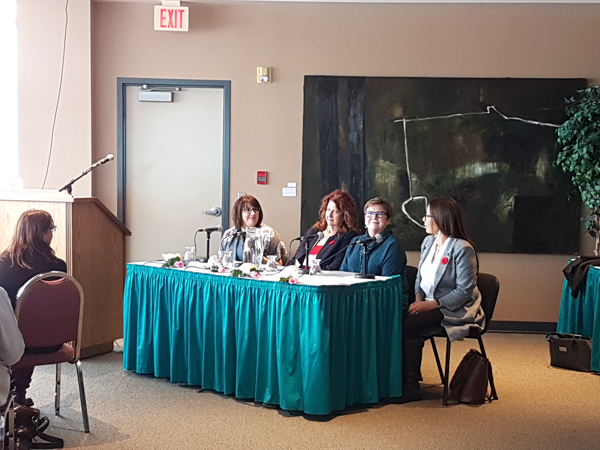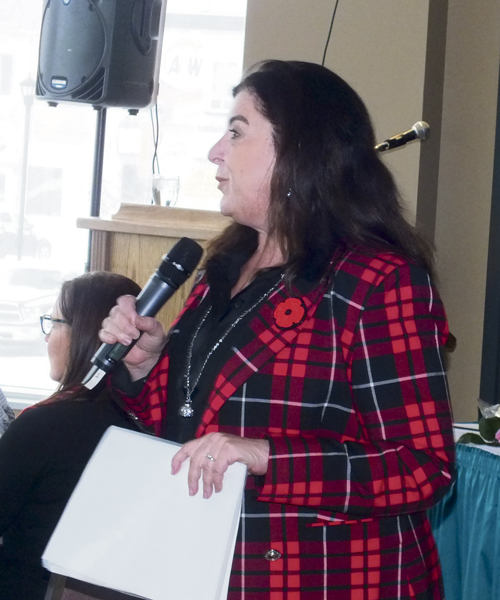
Women in Leadership Luncheon tells of obstacles faced and overcome in the hope of helping up the next generation of leaders
When attendees at a learning luncheon at the E.A. Rawlinson Centre Monday were asked to stand if everyone had ever experienced or seen sexual harassment take place, not a single person was left sitting in their seats.
That moment was just one of many in what people described as a powerful few hours with honest, real stories told by women in leadership positions from across the province.
The Prince Albert Council of Women put on Women in leadership: Practical Strategies for Transforming Intentions into Action as a part of its celebrations of Persons Day, marked on October 18 to commemorate the day in 1929 when women in Canada were legally defined as persons.
“While the significance of Persons Day is firmly rooted in the past, it is also just as firmly focused on the future, as we continue to work to overcome the challenges faced by marginalized women and girls in our society,” the group said in a media release.
“We must encourage and strengthen women’s roles by empowering them to speak up and become active leaders in all areas in our communities.”
To that end, the council invited Dr. Vianne Timmons, president of the University of Regina, to speak and to facilitate a discussion panel with four well-known female community leaders: Nicole Rancourt, Prince Albert-Northcote MLA, businesswoman Pat Weir, civic leader/volunteer Dr. Shelley Storey and Lac La Ronge Indian Band Chief Tammy Cook-Searson.
In attendance were men and women from the Prince Albert community, including dozens of students invited to hear Timmons and the panellists tell their stories.
Timmons spoke at length about some of the obstacles she’s faced, including sexual harassment, even as she worked in the top role at the U of R. She told of how she had faced discrimination or disrespect, such as when people introduced to the president of the university would walk past her to shake the hands of the men standing to her side.
That story — of people assuming it was either of the men, and not Timmons, who was the university president — resonated with Council of Women president Pat Leson.
“I don’t think it was surprising. I think everyone endures that as they assume those positions,” she said.
When Leson was an administrator at Carlton Comprehensive High School, she would get mail addressed to Mr. Pat Leson.
‘That’s when I moved over to being Patricia,” she said.
“I think every woman who has been in a leadership position has had to deal with some issues like that, and unfortunately the sexual touching which is always inappropriate. That’s something that has to change, without a doubt.”
Other speakers, such as Rancourt, talked about the importance of surrounding yourself with the type of people who will build you up.
“I talked about how there will be obstacles in your path, but to never stop,” she said.
“With regards to my story, it hasn’t been necessarily the easiest path, being a young single mom and getting my postsecondary education, and then moving towards my end goal, which was to become an MLA. I never really sat back and thought about it until it was mentioned a few times (Monday), but I was thinking about the people I have in my life. Friends and family, they’re all people who never thought my goals were unrealistic. They always encouraged me to reach my full potential. I’m very fortunate to have many people like that in my life. I wish that on everybody.”
Rancourt also touched on some of the comments that have been directed her way as she worked to join public life as an MLA. Rancourt was asked at the event if she had ever had an issue with gender biases. She recounted how many people, especially many women, wondered how she could work in Regina while taking care of her family responsibilities.
“When I asked my male colleagues, not one of them has been asked that question when they were out door knocking, but my other female colleagues have had that question as well,” she said.
“It wasn’t men who asked that question, it was always other women. I think we have to do a better job of supporting each other so we don’t have that bias within our own gender.”

Rancourt, though, like many others, was inspired by the number of young students in attendance seeking to learn from the leaders of today.
“It was nice to see a lot of postsecondary students there, and have an opportunity to talk about some of the challenges of being a female leader … and how we got to the point we’re at, potentially giving some support to any of those (future) leaders that were in the room,” she said.
Weir agreed.
“I’m very enthusiastic that there was a wonderful turnout of young people, and that they’d be interested in hearing about leadership,” she said.
“There were four very different women speaking, and I think it was great for the audience to get a different perspective about how we all handled our lives in ways that were similar or different. All four of us were passionate about our lives, and what we had done with them.”
For at least one of the women sitting out in the audience, the messages being shared were vital for students to hear.
Brenda Mishak is the acting assistant dean for the University of Saskatchewan College of Nursing in Prince Albert. She’s also an assistant professor and a past president of the council of women. Mishak brought a group of fourth-year nursing students to the luncheon.
“I (spoke) with the students after the event … and they were very inspired and impressed with the variety of leadership skills and advice they received,” she said.
Mishak pointed to the message shared by Cook-Searson, who detailed her own battles with anxiety, and about the importance of reaching out to get help.
“Chief Tammy Cook-Searson reminded them of the importance of self-care. Certainly, with nursing and nursing leadership, self-care is important to (be able to) care for others.”
Nurses are leaders, Mishak said, so for them, to understand what it takes to be a leader and some of the obstacles along the way was a vital lesson to take away.
Mishak also pointed to a theme brought up by Timmons — while women have come a long way in the last 89 years, there is still so much work to be done.
“I see a sense of complacency,” she said. “We have a ways to go as a society to keep working together collectively We don’t have equal rights for all citizens. In the 90s, women thought we were there, and we didn’t tall our daughters how hard it was. I think that really rang true for me.”
Leson ties it back to Persons Day.
“I think the important thing we have to take is yes, we have been given this right to be persons, now let’s take advantage of it and move on into taking those leadership roles we really need to assume,” she said.
Rancourt encouraged students to get involved, join committees, and do what they can to make the community strong.
“It’s important we have this dialogue,” she said.
“We’re all in the same boat. We’re just real people going through this. If we talk about it, then we won’t be sitting here in silence, feeling that we’re isolated with what we may be going through.”

